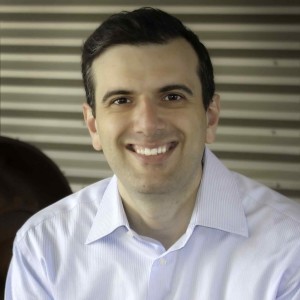In their spare time, Jaron Rhodes and Harry Vartanian attempt to predict the future.
They try to answer the question: What’s the next big thing in tech? What’s an invention that will capture the attention of giants like Apple, Google or Microsoft?
It’s their side hustle.
The pair, friends since their undergrad days at Penn, make up HJ Laboratories, a company that develops, applies for and sells patents. They hit it big last year, when they sold a patent for a flexible device display to Apple, according to AppleInsider. Rhodes and Vartanian said they could not comment on patent acquisitions.

Jaron Rhodes. (Courtesy photo)
They have 30 patents that have either been approved or are currently pending, they said. (The patent application process takes about two to three years.)
Rhodes, 35, and Vartanian, 34, are something of an anomaly in the entrepreneurship world for two reasons.
For one, they work solely in the realm of ideas — for now, at least. They leave the manufacturing and the commercialization to the companies that buy their patents.
“We’re committed to seeing our ideas go to market but what we’re capable of doing now is this, with our time and resources,” Rhodes said in an interview.
That’s the other thing that makes HJ Labs unique: both cofounders have full-time jobs outside of HJ Labs — Rhodes works in communications for Penn and Vartanian researches and writes patents at a local law firm — and they’re not looking to quit them anytime soon.
In fact, their day jobs have actually helped their work with HJ, they said. Their jobs offer them stable income, runway and the freedom to pivot and change their business model. It also allows them to be more imaginative.
“If we were working on this full time, we wouldn’t have been able to be as creative,” said Rhodes, who spent nearly a decade working in marketing for state-backed investment firm Ben Franklin Technology Partners before he joined Penn.

Harry Vartanian. (Courtesy photo)
The pair does lots of research — Rhodes says he skims 100 articles a day — and constantly bounce ideas off each other via email. They try to catch on to patterns and figure out what direction technology is heading. Since the patent process takes a few years, they’re focused on developing patents for technology that would be novel five years down the road. That’s the whole “predicting the future” part.
The other unknown is who might want to buy your patent.
“You really don’t know who’s looking for what at the time and for what reason,” Vartanian said, calling the tech patent world a “dark market.”
“No one wants to reveal what their next move is going to be,” he said.
HJ declined to disclose how many patents they had sold.
Their next big thing is indoor GPS — a way to triangulate someone’s location when they’re within a building.
“Every major company is in the market for this,” Vartanian said.
Companies:
Apple
Join the conversation!
Find news, events, jobs and people who share your interests on Technical.ly's open community Slack

Philly daily roundup: Earth Day glossary; Gen AI's energy cost; Biotech incubator in Horsham

Philly daily roundup: Women's health startup wins pitch; $204M for internet access; 'GamingWalls' for sports venues

Philly daily roundup: East Market coworking; Temple's $2.5M engineering donation; WITS spring summit

